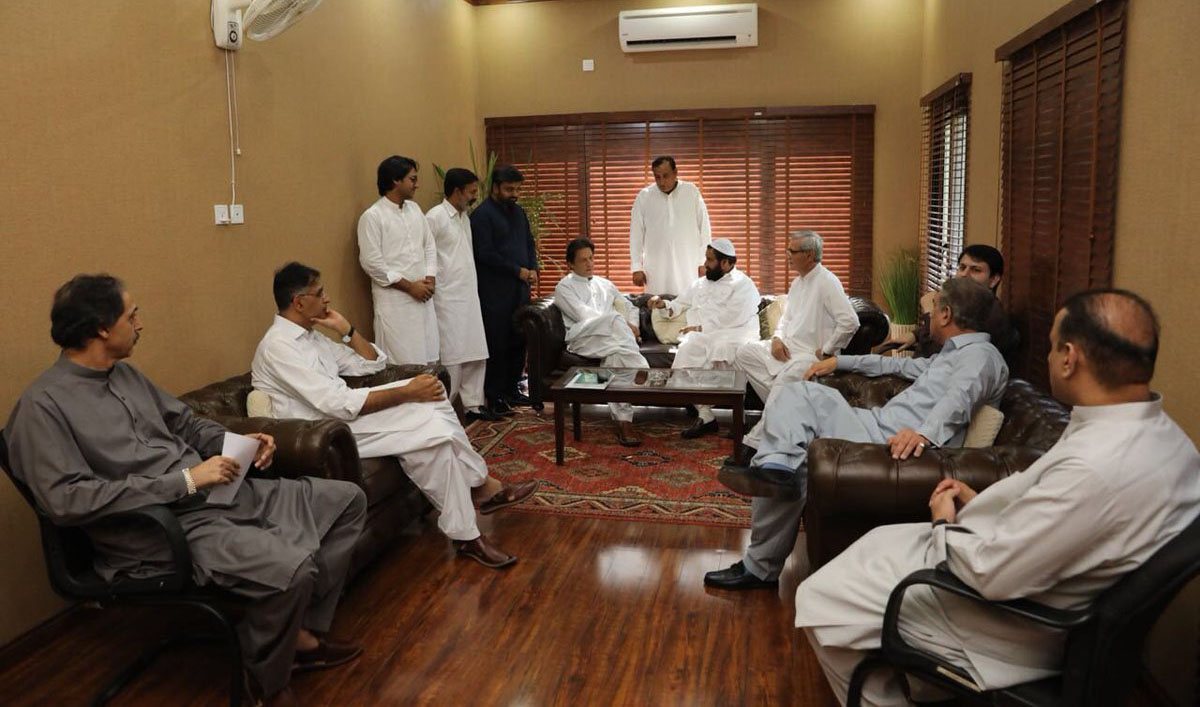ISLAMABAD: Pakistan Tehreek-e-Insaf (PTI) Chairman Imran Khan is poised to take the reins as the country’s next prime minister as his party, on Monday, claimed to have the required number to form a government in the biggest province, Punjab.
The PTI spokesman said on PTI’s official Twitter account that the process to form the government in Punjab will be completed soon.
Punjab is Pakistan’s most populous province, with 120 million people, about 60 percent of the country’s total population. It was the battleground for the two mainstream political parties, Pakistan Muslim League Nawaz (PML-N) and Pakistan Tehreek-e-Insaf (PTI), in the July 25 elections.
The PML-N has emerged as the largest party in Punjab with 129 seats, and the PTI was close behind with 123 seats, according to the election commission figures.
But in the past few days some independent candidates announced that they have joined the PTI.
The party claimed that its number in the Punjab Assembly has reached 132, and that it is the largest single party in the Punjab government.
Thirty independent candidates have won their seats in the Punjab assembly, while Pakistan Muslim League Quaid-e-Aazm Group (PML-Q) has won seven seats and the Pakistan People’s Party (PPP) has won six provincial assembly seats.

Imran Khan is meeting with Independent candidate from Rawalpindi Raja Sagheer who joined PTI on Sunday. (Photo courtesy: PTI)
PML-Q support, according to analysts, will play a crucial role in forming the government in the province.
A PTI spokesman claimed that the PML-Q has decided to support the PTI in the province.
“Without control over Punjab, the PTI government in the Center will not be able to implement its reform agenda,” senior political analyst Zahid Hussain told Arab News.
He added: “With an opposition party, the PML-N, at the helm in the biggest and most powerful (Punjab) province, the federal government will not be effective.”
The PML-N, which has run the provincial government in the past 10 years, is also making all efforts to form the government in Punjab. It is trying to reach out to those elected as independent candidates and is also in talks with the PPP for support.
The Punjab Assembly comprises 295 members, and a simple majority of 148 is needed to form a government.
“The PTI-led federal coalition government will soon become a reality … having a PTI government in Punjab will reinforce the federal government’s strength,” senior political analyst Rahim Ullah Yusafzai told Arab News.
Imran Khan’s party has emerged as the single largest single party at the center with 116 seats in the 272-member National Assembly, and to reach the 137 magic number several independent candidates have already joined the PTI. Smaller parties such as the Pakistan Muslim League-Q and Balochistan Awami Party (BAP), with four national assembly seats each, will join Imran Khan’s coalition government.
The PTI is also negotiating with independent candidates and smaller parties such as the Grand Democratic Alliance and Muttahida Qaumi Movement Pakistan to fortify its number at the Center.
PML-N won 64 seats and Pakistan People’s Party with 43 seats have already decided to sit on the Opposition bench.
In Pakistan northwestern province of Khyber Pakhtunkhwa, the PTI got a thumping majority in the provincial assembly and bagged 67 out of 97 seats.
“PTI, with two-thirds majority in Khyber Pakhtunkhwa Assembly, will be able to form a stable government and will have no excuse for failing to complete its reforms agenda as it will also be running the federal government, unlike its previous stint in power when an uncooperative PML-N was in control of the Center. The PTI will also get the opportunity to implement reforms in the erstwhile FATA after its merger with Khyber Pakhtunkhwa,” Rahim Ullah Yusafzai told Arab News.
In South Western Province, the BAP has emerged as the largest party and the PTI is negotiating with the BAP to form a coalition government in Balochistan.
Whereas in Sindh province, PPP as the single largest party, will form a provincial government.
The country’s major political parties, including some regional parties, have rejected the election results and claimed mass rigging.
The Election Commission of Pakistan has rejected the rigging claims.
“The PTI will have to work hard to gain legitimacy in view of allegations of rigging in the election and function smoothly in the presence of a strong opposition,” Rahim Ullah Yusafzai said.


















